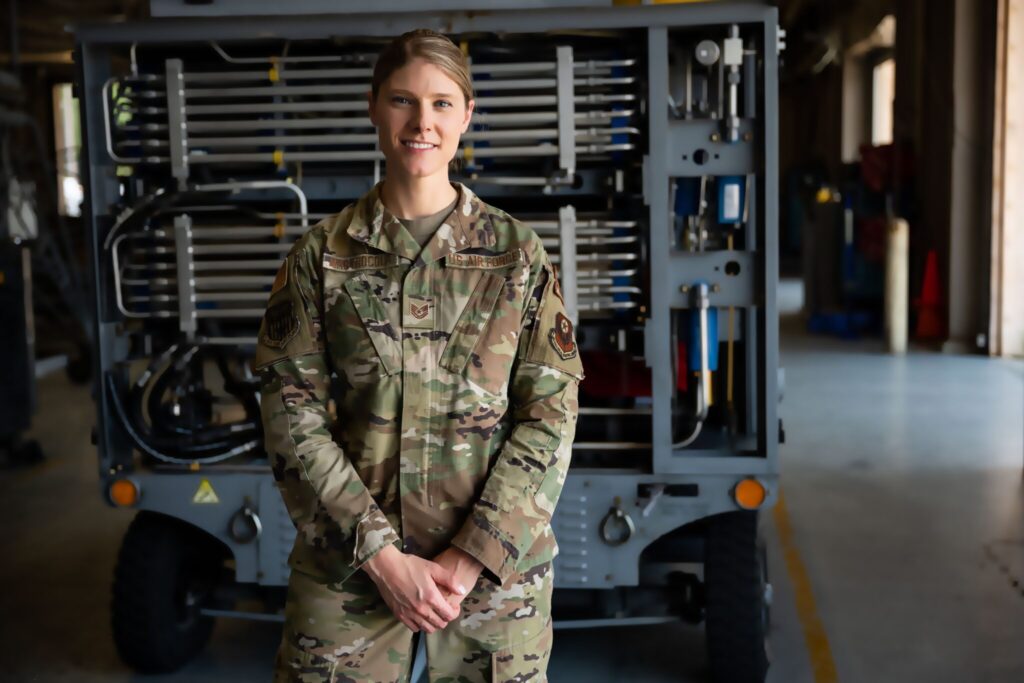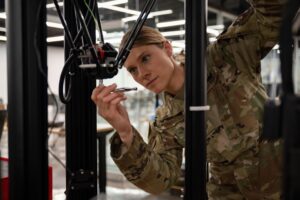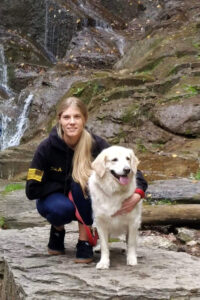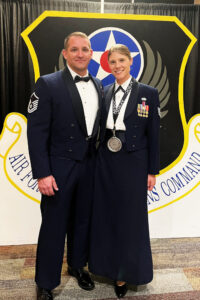
The assignment from her professor was to record herself on video answering a prompt. The chaos of a wartime deployment kept interrupting her as she tried repeatedly to make a good product. Just as she was satisfied with her final attempt, the siren warning of incoming fire sounded.
“So, there were the red tracer rounds, and the alarm, and the incoming,” Air Force Tech. Sgt. Kimberly Mastrocola said. “I submitted the video, and thought, ‘hopefully my professor doesn’t ask me what that was all about.’”
Mastrocola worked on her master’s degree in extraordinary circumstances while deployed at Bagram Air Force Base, Afghanistan, in 2019. Now, she is making waves while enrolled as an online PhD student at Colorado State University.
In 2021, only 2.3% of enlisted airmen had an advanced degree, compared with 40% of commissioned officers, according to a Department of Defense report. Across the military, the proportion of enlisted service members with a higher education has only increased since 2010, signaling the growing value the military puts on applicable education and retention. Still, as an enlisted airmen enrolled in a PhD program, Mastrocola is highly unusual. In July, she was selected as one of the Outstanding Airmen for 2023, one of only 12 extraordinary noncommissioned officers to receive the honor.
Historically, enlisted Airmen didn’t need university education. Only officers needed a bachelor’s degree. This is still mostly true, but as the battlespace becomes more complex, the need for continuing education across the force is increasing.
Mastrocola was selected for the award in part because of her leadership in high-profile projects, her involvement in coordinating three hackathons, and her leadership of STEM educational events impacting thousands of students, according to the award description. Her drive in gaining an advanced education also likely played a role. The board selection was highly competitive, with multiple levels of peer-to-peer competition and a thorough accounting of every career event and achievement to date.
“I was never seeking recognition,” Mastrocola said. “I always just wanted to have opportunities and challenge that would help me grow.”
Reading books while enabling modernization through experiential expertise

With a long family history of military service, Mastrocola started her career without a college education. Tired of sitting in classrooms, she wanted to get to work after high school, but she also wanted to keep learning. So, she did that, too.
“I think back at times as a young Airman where I’d be on the flightline refueling equipment in the snow with one hand and keeping a wet textbook open in the other,” she said. “Really using every minute of free time to study. I look back and think of the work I put in to get where I am now.”
When she was selected for the Outstanding Airmen award, Mastrocola was assigned to the Innovation (or “Spark”) Cell of the 1st Special Operations Wing in Hurlburt Field, Florida. These cells focus on finding creative ways to accelerate change and modernize the force. As an aerospace ground equipment technician, Mastrocola said her job often involved finding better ways to improve integration of existing systems and processes.
Ground technicians maintain aircraft support equipment, which means they have a wide scope of duties. They are knowledgeable about diesel systems, electric power, pneumatics, hydraulics, and even HVAC systems. As maintainers heavily involved in moving expensive aircraft, Mastrocola said the job requires constant learning.
“We’re kind of the jack of all trades,” she said. “We are critical thinkers. We’re creative thinkers. We like to tinker. There’s a lot of talents in the maintenance community. Years ago, it was hidden talent, but now it’s starting to come out and be more visible.”
Mastrocola’s interests and career goals are aligned with Air Force priorities. In 2020, Air Force Chief of Staff Gen. Charles Q. Brown, Jr. Published his strategic approach entitled Accelerate Change or Lose, where he discussed his vision for the Air Force as adapting to shifts in technology, the environment, and aggressive global competitors.
Mastrocola said she thrives in creative and challenging environments where she is encouraged to experiment and discover better ways for accomplishing the mission. Her position in the innovation cell gave her the freedom to address real problems, the kinds that systems engineers face daily.
Systems engineering enables technical innovation in aerospace

Mastrocola earned her master’s degree from Embry-Riddle Aeronautical University. She then chose the CSU systems engineering program for her PhD because of the accessibility of the online aspect of the program, and because she thought it would increase her effectiveness as a noncommissioned officer and Airman innovator.
“I just finished a class in engineering risk analysis over the summer, and I’ve already used it a lot,” she said. “Systems engineering ties together the creativity side of finding solutions to problems with the more logical thinking side of engineering, and that’s what I can use.”
Systems engineering is a multidisciplinary field that acts as the bridge between engineering disciplines to ensure that projects are successful.
Her favorite course since starting her degree program in January has been Spaceflight and Biological Systems where she learned about how to make spaceflight more sustainable. Steve Simske, Systems professor, taught the course and is Mastrocola’s graduate advisor.
Simske said he tailored the course to active members of the aerospace sector, who make up more than half of the students enrolled in the Systems department.
“CSU, as an education-for-life supporting institute, has an important role in supporting our current and future leaders like Kimberly,” Simske said. “We strive to equip our students with relevant knowledge and meta-cognitive tools to help them create both better systems and a better world.”
Seeking and finding support.

Mastrocola is slated for another promotion to master sergeant in the coming months. She is originally from New York but said she has a strong support system across the country.
“Being a female mechanic in a male dominated field has not always been easy, but I had a lot of people who looked out for me and saw the potential I had,” she said. “I am grateful to them and have spent a lot of time writing thank you letters lately.”
Air Force veteran Jeremy Daily, associate professor, CSU Systems, was once a meteorological and navigation systems technician in the Air Force. Now he works on cybersecurity of heavy trucks and other vehicles.
“I’m impressed and happy to see people like Tech. Sgt. Mastrocola join our program,” he said. “We embrace our nations’ NCOs in the department of Systems Engineering, and we are here to support when they come looking for more.”